|
|
|
Sort Order |
|
|
|
Items / Page
|
|
|
|
|
|
|
| Srl | Item |
| 1 |
ID:
090861
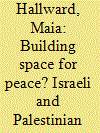

|
|
|
|
|
| Publication |
2009.
|
| Summary/Abstract |
This article investigates the limitations of peace theory in comparing and contrasting strategies adopted by activist groups working to resolve conflicts of varying types in varying contexts. Using the case of seven Israeli and Palestinian peace and justice groups that remained active after the collapse of the Camp David negotiations and the outbreak of the Second Intifada, the article illustrates the benefits of a process-based approach to peacebuilding for examining how, why, and to what extent approaches used by these groups changed between 2004-05 and 2008. The findings highlight how domestic, regional, and international changes have affected the operation of peace and justice activists, and suggest that those interested in progress towards a negotiated peace agreement should not assume that past policy instruments will work in the current environment.
|
|
|
|
|
|
|
|
|
|
|
|
|
|
|
|
| 2 |
ID:
090872
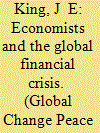

|
|
|
|
|
| Publication |
2009.
|
| Summary/Abstract |
The recession has apparently led to a surge of school-leavers applying to study economic at university (in the United Kingdom). Application were up by 15% in January, and similar increases have been recorded for school economics lessons for 16-and 18-year-olds...One of the areas Prospective economics students might care to study is why most economics failed to foresee the recession, and why those who did made not a blind bit of difference.
|
|
|
|
|
|
|
|
|
|
|
|
|
|
|
|
| 3 |
ID:
090858
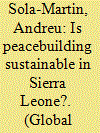

|
|
|
|
|
| Publication |
2009.
|
| Summary/Abstract |
This paper explores the role of the international community in promoting liberal peacebuilding in Sierra Leone. It identifies two key challenges to the sustainability of peacebuilding: insufficient opportunities for the social reintegration of ex-combatants and the escalation in social tensions as a result of the exploitative nature of international mining ventures operating through patrimonial networks. Despite the success of the UN peacekeeping mission to Sierra Leone, the institutionalisation of peacebuilding initiatives by the international community has not addressed the root causes of the conflict. Sierra Leone still lacks basic material capabilities to sustain peace and support development. This paper is based on UN documents, policy reports, relevant literature and field work interviews.
|
|
|
|
|
|
|
|
|
|
|
|
|
|
|
|
| 4 |
ID:
090857


|
|
|
|
|
| Publication |
2009.
|
| Summary/Abstract |
Perpetrators of genocide are likely to use a variety of tactics to reduce outrage from their actions. The main sorts of tactics are covering up the actions, devaluing the target, reinterpreting the actions in ways that minimise seriousness and responsibility, using official channels to give an appearance of justice, and using intimidation and bribery. The 1994 Rwandan genocide reveals ample evidence of all these tactics. Critics of genocidal behaviour should expect the use of these tactics and be prepared to counter them. A focus on tactics concerning outrage over genocide is a complement to the usual approaches looking at history, psychology, social dynamics, causes and responsibility.
|
|
|
|
|
|
|
|
|
|
|
|
|
|
|
|
| 5 |
ID:
090869


|
|
|
|
|
| Publication |
2009.
|
| Summary/Abstract |
Writing shortly after North Korea's inaugural nuclear test in late 2006, Jonathan Pollack observed that a decision to proceed with additional testing would constitute compelling evidence that the DPRK deemed the first test results unsatisfactory and that Pyongyang's goals for its nuclear programe are more ambitious than a one-time demonstration of strategic autonomy.
|
|
|
|
|
|
|
|
|
|
|
|
|
|
|
|
| 6 |
ID:
090862
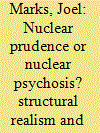

|
|
|
|
|
| Publication |
2009.
|
| Summary/Abstract |
With mounting concern over Iran's nuclear ambitions and the recent convening of the International Commission on Nuclear Non-Proliferation and Disarmament, nuclear proliferation has once again been elevated to the forefront of global security concerns. This article critically reviews the controversial theoretical arguments made by the two leading structural realists in the United States, Kenneth Waltz and John Mearsheimer, that the proliferation of nuclear weapons to new states will be beneficial for the maintenance of global security and assesses to what extent their 'proliferation optimism' has been validated by recent history. As the article argues, theoretical and empirical deficiencies within Waltz's and Mearsheimer's analyses render their optimistic scenarios regarding nuclear proliferation highly questionable. The dangers of nuclear proliferation are then illustrated by assessing the recent history of interstate military rivalry and conflict between two of the world's newest nuclear armed states, India and Pakistan.
|
|
|
|
|
|
|
|
|
|
|
|
|
|
|
|
| 7 |
ID:
090864
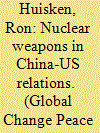

|
|
|
|
|
| Publication |
2009.
|
| Summary/Abstract |
Following the revival of interest in a deliberate process of reduction in the nuclear arsenals, eventually to zero, this article looks at a dimension of this challenge that has been overshadowed by the Cold War US-Soviet/Russia nuclear relationship and its legacy, namely, how nuclear weapons have figured in the relationship between the US and China. The topic highlights itself both because East Asia exemplifies the full range of challenges that confront the quest for nuclear disarmament and because the US-China relationship has been singled out as likely to be the defining relationship of this century.
|
|
|
|
|
|
|
|
|
|
|
|
|
|
|
|
| 8 |
ID:
090866
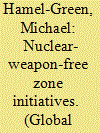

|
|
|
|
|
| Publication |
2009.
|
| Summary/Abstract |
The successful 2006 negotiation of the Central Asian Nuclear Weapon Free Zone (CANWFZ) Treaty indicates the continuing relevance of regional denuclearization measures as an important element in global non-proliferation strategies. Following on earlier nuclear-weapon-free zones in Latin America, the South Pacific, Southeast Asia and Africa, the CANWFZ is the first to be wholly located in the Northern hemisphere. Such zones face major challenges, including the existence of major regional conflicts, regional proliferation developments, lack of effective regional organizations in some regions for negotiating cooperative security arrangements, and difficulties in securing negative security guarantees from nuclear weapon states. Despite in-principle support to such zones, the nuclear powers, with the exception of China, have been highly selective in giving security guarantees to specific zones, with only two zones (Latin America and South Pacific) securing guarantees from most of the nuclear states. Nuclear weapon states are continuing to put their own military navigation, transit or deployment interests ahead of the non-proliferation benefits flowing from whole regions making binding agreements not to develop, acquire or possess nuclear weapons. New opportunities for nuclear-weapon-free zone establishment may be found in a return to multilateralist approaches with the advent of the US Obama Administration, current regional negotiations, and the role of middle level powers in mobilizing international support for nuclear-weapon-free zone initiatives, including further conferences of nuclear-weapon-free zone member countries. Proposed steps forward include: nuclear weapon state reviews of the current non-proliferation benefits of nuclear-weapon-free zones; commissioning of a new UN Experts' Study on nuclear-weapon-free zones; regional studies of the human, economic and climatic impact of nuclear war; and renewed regional nuclear-weapon-free zone efforts to establish new zones and strengthen existing zones.
|
|
|
|
|
|
|
|
|
|
|
|
|
|
|
|
| 9 |
ID:
090874


|
|
|
|
|
| Publication |
2009.
|
| Summary/Abstract |
President Barack Obama has inherited an unenviable legacy in relation to Iran. Relations between Iran and the United States have suffered blow after blow in the last three decade.
|
|
|
|
|
|
|
|
|
|
|
|
|
|
|
|
|
|
|
|
|